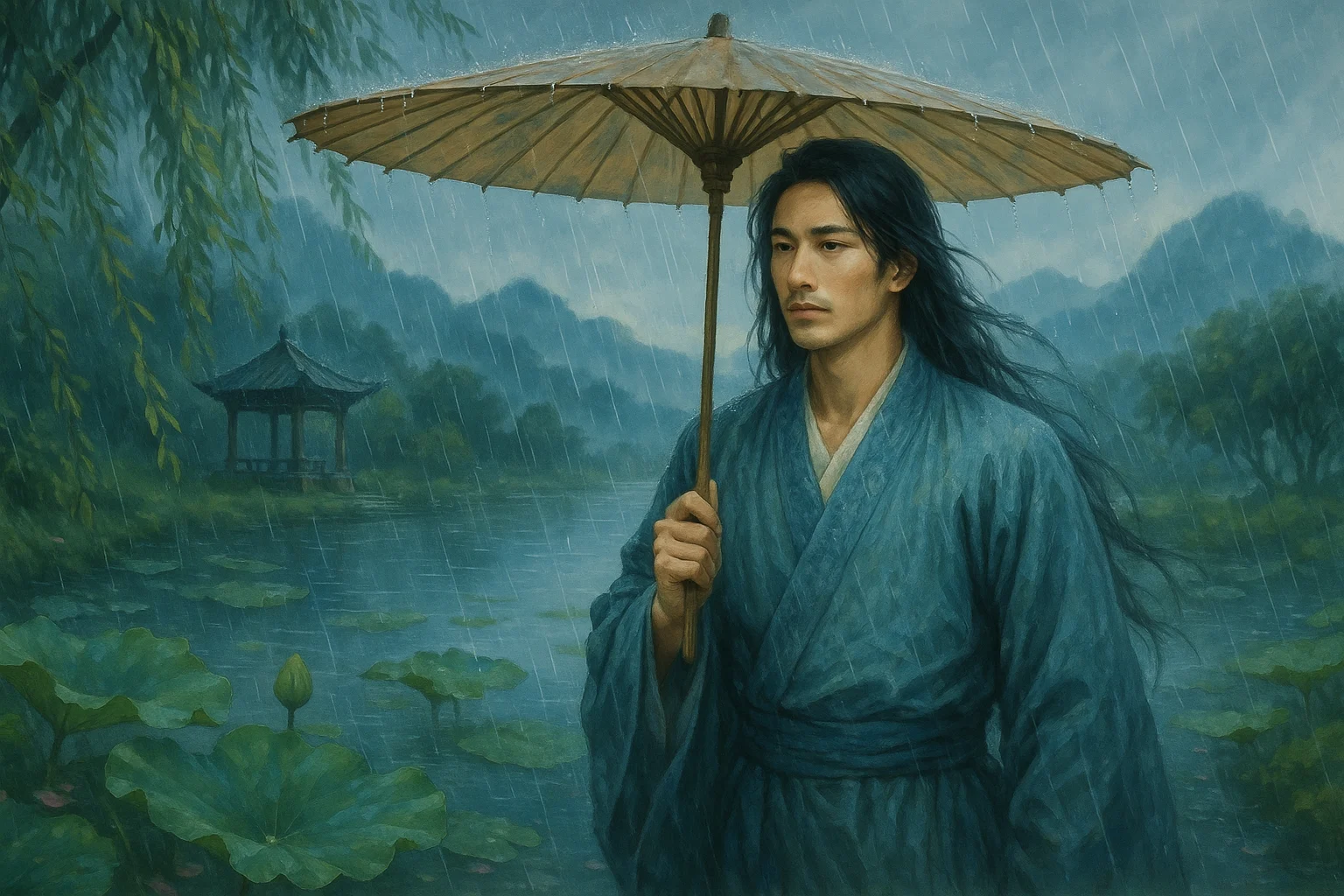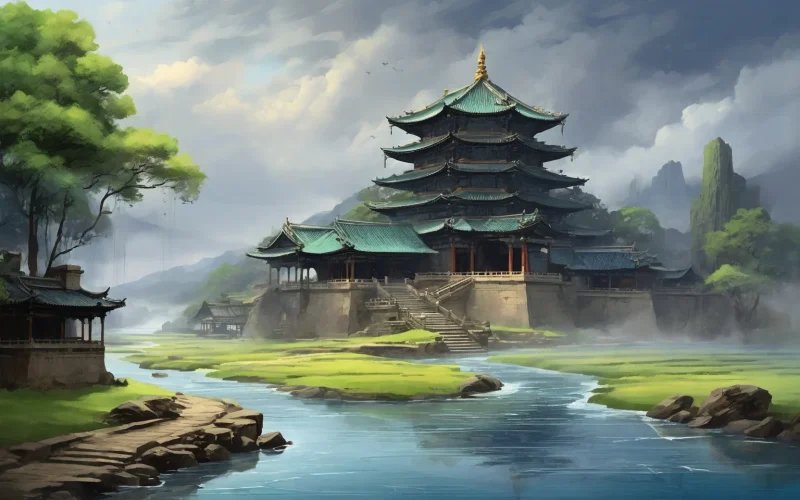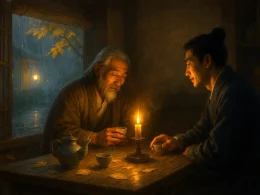O West Pool road! Untouched by sorrow’s tread,
While spring’s last breath pursues blooms’ dying bed.
Now by the pool I trace night’s secret trace—
Where newborn lotus claimed its watery space.
Old friends’ vast worries weave a thorny crown,
Though silent scrolls, their hearts still beat renown.
That river sunders us—a cruel divide,
Long pavilions weep where storms abide.
Original Poem
「菩萨蛮 · 客愁不到西池路」
客愁不到西池路。残春又逐花飞去。
今日傍池行。新荷昨夜生。故人千虑绕。不道书来少。
吕本中
去住隔关河。长亭风雨多。
Interpretation
This lyric was likely composed during Lü Benzhong's sojourn in Jiangnan, a period marked by longing for old friends amidst relentless warfare and severed communications. The "Western Pond" (Xī Chí) serves as both physical setting and emotional touchstone—a site of past gatherings now imbued with nostalgia. Though late spring brings budding lotuses to the pondside, their beauty intertwines with the poet's sorrow, creating a poignant Southern Song tableau where seasonal transition mirrors human transience.
First Stanza: "客愁不到西池路。残春又逐花飞去。今日傍池行。新荷昨夜生。"
Kè chóu bù dào Xī Chí lù. Cán chūn yòu zhú huā fēi qù. Jīnrì bàng chí xíng. Xīn hé zuóyè shēng.
My traveler's grief never treads the path to Western Pond,
yet fading spring chases blossoms into flight.
Today I walk beside its waters—
where young lotuses rose last night.
The stanza opens with paradoxical denial: "grief never treads" suggests the pond remains untouched by sorrow, yet "fading spring" undercuts this illusion. The sudden appearance of "young lotuses" offers fragile hope—a natural rebirth contrasting with human loss.
Second Stanza: "故人千虑绕。不道书来少。去住隔关河。长亭风雨多。"
Gùrén qiān lǜ rào. Bù dào shū lái shǎo. Qù zhù gé guān hé. Cháng tíng fēngyǔ duō.
A thousand thoughts of old friends twine round me,
though we never speak of letters gone astray.
Parted by frontiers and rivers,
how the rain sweeps through farewell pavilions!
Here, restraint deepens the ache: "never speak of letters" implies unvoiced yearning, while "frontiers and rivers" materialize separation. The final image of storm-lashed pavilions—waystations for departures—condenses exile's relentless sorrow.
Holistic Appreciation
Compact yet resonant, the lyric moves from evasion ("grief never treads") to confrontation with absence. The pond's lotuses, symbols of purity in Buddhist thought, highlight what persists amid flux; the "unspoken" scarcity of letters reveals companionship's erosion. By stanza's end, nature's cycles (sprouting lotuses) clash with human rupture (frontiers, storms), framing the Southern Song literati's central tension: how to reconcile beauty with impermanence.
Artistic Merits
- Symbolic Landscapes
The pond embodies memory, its lotuses fleeting grace; "frontiers and rivers" externalize emotional distance. - Paradox as Technique
Denial ("grief never treads") intensifies presence—the very act of negation confirms sorrow's grip. - Silence as Expression
"Never speak of letters" speaks volumes; restraint here deepens pathos. - Cinematic Pacing
From pondside stroll to storm-wracked pavilions, the poem "zooms out" from intimacy to desolation.
Insights
The lyric teaches us that profound loss often dwells in the unsaid. The poet's refusal to lament missing letters ("不道") makes their absence louder; his focus on newborn lotuses ("新荷昨夜生") amidst separation suggests resilience. Like the pond—at once refuge and reminder—our griefs and comforts often share the same ground. Southern Song poets mastered this duality, finding in nature's continuities a counterpoint to human fragility. Their legacy is this: to witness decay and rebirth without flinching, as Lü does here between lotus and storm.
About the Poet

Lü Benzhong (吕本中 1084 - 1145), a native of Shouxian in Anhui, was a renowned poet and Neo-Confucian scholar of the Southern Song Dynasty. As a key theorist of the Jiangxi Poetry School, he proposed the concept of "living method" (huofa), advocating for natural variation within established poetic rules. With over 1,270 surviving poems, his Genealogy of the Jiangxi Poetry School (Jiangxi Shishe Zongpai Tu) established Huang Tingjian as the school's patriarch, profoundly influencing Song poetic theory and serving as a bridge between the Jiangxi School and the Four Masters of the Mid-Song Revival.












